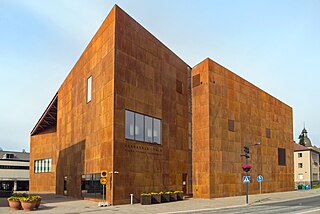
Kangasala is a town in Finland, located in the Pirkanmaa region. It lies to the east of the regional capital, Tampere. The population of Kangasala is approximately 34,000, while the metropolitan area has a population of approximately 421,000. It is the 34th most populous municipality in Finland.
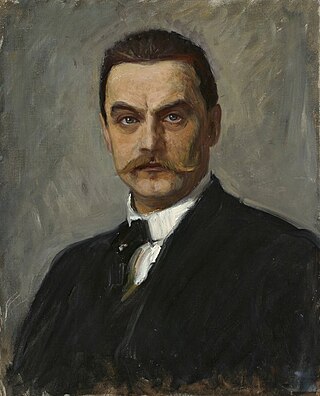
Albert Gustaf Aristides Edelfelt was a Finnish painter noted for his naturalistic style and Realist approach to art. He lived in the Grand Duchy of Finland and made Finnish culture visible abroad, before Finland gained full independence. He was considered the greatest Finnish artist of the second half of 19th and the first half of the 20th centuries, and one of the most prominent contributors to the Golden Age of Finnish Art.

Jörn Johan Donner was a Finnish writer, film director, actor, producer, politician and founder of Finnish Film Archive. He produced Ingmar Bergman's film Fanny and Alexander, which won four Academy Awards in 1984. Donner also served in the Finnish parliament and the European Parliament, making significant contributions to both cinema and politics.

Finnish National Gallery is the largest art museum institution of Finland. It consists of the Ateneum, an art museum; Kiasma, a contemporary art museum; and the Sinebrychoff Art Museum, a historic house and art museum.

Pasteur's portrait by Edelfelt is the best-known portrait of the French chemist Louis Pasteur. Painted by Albert Edelfelt (1854–1905) in 1885 the painting shows Pasteur in his laboratory at the rue d'Ulm, surrounded by his experimental apparatus, the innovative laboratory glassware used in the experimental methods, developed by him on the field of bacteriology in the late 19th century. Pasteur is regarded as one of the main founders of bacteriology, and he is popularly known as the "father of microbiology".

Knut Magnus Enckell was a Finnish symbolist painter. At first, he painted with a subdued palette, but from 1902 onwards, used increasingly bright colors. He was a leading member of the Septem group of colorist painters. In Finland, Enckell is considered to have been a very influential symbolist artist.

Adolf von Becker was a Finnish genre painter and art professor of German descent. He was one of the first Finnish artists to study in Paris, who taught many of the young artists of the Golden Age of Finnish Art.

Gunnar Fredrik Berndtson was a painter from the Grand Duchy of Finland who was noted for his attention to realistic detail.
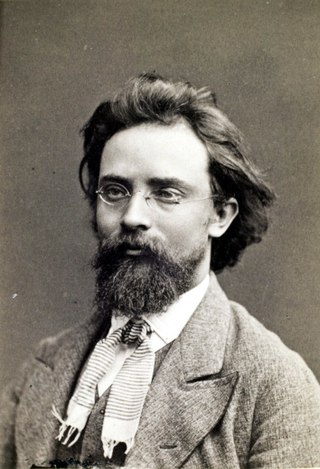
Walter Magnus Runeberg was a Finnish neo-classical sculptor. He was the son of Finnish national epic poet Johan Ludvig Runeberg.

Baron Viktor Magnus von Born was a Finnish lawyer, farmer and politician. He was a member of the Diet of Finland from 1877 to 1878 and from 1885 to 1906 and of the Parliament of Finland from 1910 to 1913, representing the Swedish People's Party of Finland (SFP). He was the last Lord Marshal of the Diet of Finland in from 1905 to 1906.

Pietro Købke Krohn was a Danish painter, illustrator, theatre director and museum director. He is remembered above all for his work together with Otto Haslund, illustrating Johan Krohn's book Peters Jul

Luxembourg Gardens, Paris is an oil painting completed in 1887 by the Finnish artist Albert Edelfelt depicting a scene in the Jardin du Luxembourg in Paris, France. The painting has become a kind of symbol of Edelfelt and the whole of Finnish art, at a time when Paris was the center of the art world. It is one of Edelfelt's larger paintings and a major en plein air painting.

Anna Taina Aleksandra Kortelainen is a Finnish scholar, art historian and non-fiction writer.
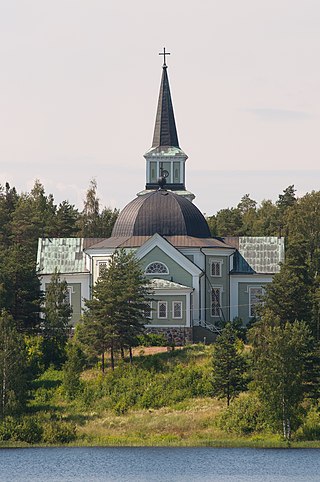
Ruokolahti Church is the Lutheran church in the town centre of Ruokolahti, in south-eastern Finland, and the main church of the Ruokolahti parish.

Läroverket för gossar och flickor, also known as Brobergska samskolan or Broban, was a Swedish-language school that operated in Helsinki, Finland, from 1883 to 1973. The school was the first co-educational school in Finland. The author and artist Tove Jansson, creator of Moomin, went to Läroverket för gossar och flickor.

The March of the Björneborg Regiment is a gouache painting by Finnish painter Albert Edelfelt completed in 1892.
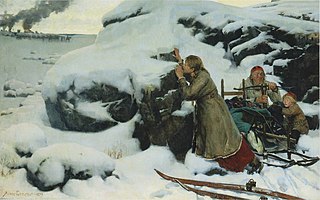
Burnt village is an oil-on-canvas painting by Finnish painter Albert Edelfelt completed in 1879.
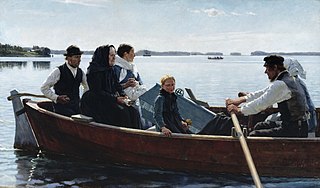
Conveying the Child's Coffin (A Child's Funeral) is a painting by Finnish painter Albert Edelfelt completed in 1879.

Boys Playing on the Shore is a painting by Finnish painter Albert Edelfelt completed in 1884.

Queen Blanche is a painting by Finnish painter Albert Edelfelt completed in 1877.





















